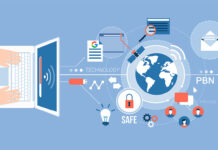
All You Need To Know About ERP For Retail Enterprise Resource Planning encapsulates software that is used to run a business effectively into one single or unified platform. This comprehensive platform takes care of the business requirements, thus managing the business more effectively. ERP system use is prevalent in every sector, but the use of ERP for retail has been overgrowing and has become indispensable for every retail business. With the rise in demand for ERP software for the retail industry, an increased number of retailing is falling on ERP solutions.
In 2018, the ERP software market was found to be at an impressive figure of $35.81 billion; Furthermore, it is estimated that by 2026, the ERP market can grow to around $78.40 billion. The estimated CAGR rate is 10.2% starting from 2019 until 2026.
This article gives us an overview of ERP for retail in detail.
Overview of ERP for Retail
ERP involves different pieces of software that are usually considered as separate entities. ERP facilitates a combination of the various parts of the software and allows the quick and easy flow of data. With ERP, the data can be made to use more accurately and without any difficulty. In addition to that, ERP ensures the enhanced flow of information and greater accessibility of information.
ERP covers several aspects of a business, such as
- Planning of product and its cost
- Manufacturing of the product and delivery of service
- Sales and Marketing areas
- Shipping, inventory management and procuring payments
As ERP centralizes information and controls the functioning of the software, the retail stores are also benefited from the ERP as the software becomes comprehension and ensure smooth and better management of work with seamless progress. Hence, ERP is more robust, better, and more effective for the retail industry.
The ERP software works best for retailers who are keen on strengthening their position or addressing the requirements of a business, including investing in a unified piece of software. ERP is cheaper than other options and provides better advantages; as a result of which ERP software has managed to earn in the retail business as a result. Its practical approach and enhanced functionality can work wonders for the companies.
Different types of Retailers that purchase ERP based software for retail
- For a small retailer or a startup company, the most critical requirement is the basics. Unlike smaller retailers, ERPs are the best for more prominent retailers that spread their business over several locations with an increased number of registrations.
- As soon as a retail chain spread its chain and starts operating from more number of locations, they tend to look for software that can help meet its day to day requirements. For retailers who are keen on stepping up from small to medium-sized, ERP can be a good investment. ERP platforms scale up according to the needs of the company and thus help the retail business to flourish with time.
Top Must-have ERP Features for the Retail Industry
Now, let us look at the main features of the ERP platform for your retail business to work the best. All You Need To Know About ERP For Retail
- Multichannel Services: Over the years, there has been a continuous change in the retail business. One important thing that we must consider is the omnichannel presence that has become the lifeline of many retailers in recent years.
- Omnichannel involves the overall idea of providing enhanced shopping experience to the clients through the different channels that they might have used to buy your product.
- Hence, it would help if you emphasized every sales channel. ERP system comes to play here, as it provides real-time information regarding your inventory and the necessary information related to shipping.
- CRM Module: Almost all ERP platforms are equipped with a basic CRM module, which lets the retailers understand the customers’ buying habits and how customers are keen on getting associated with the brand.
- Whenever it comes to CRM, you must observe the ERP closely. Walking in shoes of the customers and understanding whether the system will be able to tackle all situations can be beneficial. This can help your employees interact with the clients and involve them in the conversation using online tools or phones.
- Warehouse Management: Systems offering warehouse management can be found in plenty, but it is imperative to identify one that establishes a better connection with the ERP system. With an ERP system, one barcode scan makes automatic updates, thus making it simpler and more manageable.
- Integration of Accounting System: It is recommended to opt for the best ERP software that offers an integrated accounting system. Under such ERP software for retail business, the conventional accounting principles are combined with every aspect of the business, such as purchases, sales, inventory management, and warehouse.
- ERP software with an integrated POS facility provides real-time information about the point of sale.
Now that you know about ERP software for retail business, explore them today!





